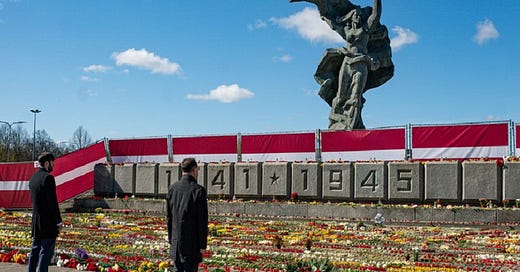Latvia’s War On Soviet-Era WWII Monuments Ruins The West’s Reputation
The Hybrid War on historical memory in this tiny Baltic State of a little less than two million people is of outsized significance in terms of the evolving ideological dimensions of the New Cold War.
The US-led West is officially proud of having played a major role in the liberation of Europe from Nazi Germany during World War II, yet some of its members like the growing number of ultra-nationalists in Latvia strongly resent being associated with that. Many of their forefathers openly collaborated with Nazi Germany and participated in the Holocaust because, in their mind, this was the so-called “lesser of two evils” between doing that and siding with the Soviet Union that they regard as having “occupied” them in 1940 following the Secret Protocol agreed to in the Molotov-Ribbentrop Pact.
The last-mentioned event, which the USSR’s Russian successor state regards as an accession that was legal in the eyes of international law despite never being recognized as such by the West, ended their people’s historically unprecedented experiment with independence during the interwar period. Most of Latvia was liberated from Nazi occupation by the end of 1944, though a certain amount of the locals regarded that as a return to supposedly illegal “Soviet occupation”. Accordingly, many of their ancestors now consider Soviet-era World War II monuments to the Red Army to be monuments to “occupation”.
These weren’t demolished after the collapse of the Soviet Union, despite the agitation of those contemporary ultra-nationalists whose forefathers literally collaborated with the Nazis, because Riga reached an agreement with Moscow in 1994 to preserve these monuments in exchange for Russia doing the same to sites dedicated to Latvian victims of war and Soviet government repressions. Latvia also had to contend with the fact that around one-third of its post-independence population were ethnic Russians, many of whom migrated there for economic reasons during the Soviet era.
The authorities therefore wisely thought it better not to risk their wrath by tearing down monuments to their forefathers who sacrificed so much to free Europe from the Nazis’ genocidal occupation that ultimately resulted in the deaths of over 26 million Soviet citizens in less than four years. Even though approximately two-thirds of Latvia’s so-called “non-citizens” (which total a little less than 10% of its current population) are ethnic Russians and therefore aren’t accorded full rights, Latvia was still able to project a sense of “Western values” by keeping these anti-fascist World War II monuments around.
That’s all about to change though after the Latvian parliament just approved the disavowal of its commitments connected to the 1994 agreement with Russia not to dismantle Soviet-era World War II monuments. This comes right after locals twice carpeted the Liberators of Riga monument in the Latvian capital with flowers from 9-10 May despite the authorities doing their utmost to prevent them from doing so. It’s therefore clear that a sizeable percentage of the population, presumably mostly comprised of ethnic Russians but likely not entirely, is against demolishing this and other similar such monuments.
The reason that this latest development is so problematic for the West’s reputation is because this US-led civilizational bloc will likely remain silent in the face of an ultra-nationalist government dismantling monuments commemorating the liberation of their country from the Nazis’ genocidal occupation. Even worse, many might actually cheer it on under the pretext of “decommunization” that in this context would just be a euphemism for Russophobia, which is a variant of fascism no less evil than antisemitism. In other words, the US-led West will proudly support removing literally anti-fascist monuments.
The optics don’t matter to most of that civilization’s people anymore who’ve convinced themselves that the USSR was just as bad as Nazi Germany, if not worse. They’ve arrived at this historically revisionist conclusion that completely ignores Hitler’s genocides of Jews, Roma, Slavs, and many others after years of being targeted by their unipolar liberal-globalist elite’s information warfare. In their mind, World War II shouldn’t have ended with the Nazis’ defeat but with the immediate beginning of World War III upon the commencement of Churchill’s “Operation Unthinkable” for invading the USSR.
With this literally fascist mindset that by default whitewashes the Nazis’ historically unprecedented crimes against humanity, it’s supposedly logical to many Westerners why Latvia would want to dismantle monuments to the same army that was responsible for a whopping 80% of the Wehrmacht’s casualties. In fact, some might even support Latvian ultra-nationalists’ potential campaign to replace those Red Army monuments with ones commemorating their literally fascist forefathers who collaborated with Hitler and participated in the Holocaust, all with possible applause from the West.
It's for these reasons why the Hybrid War on historical memory in this tiny Baltic State of a little less than two million people is of outsized significance in terms of the evolving ideological dimensions of the New Cold War. Whereas Russia has officially incorporated anti-fascism into its multipolar conservative-sovereigntist worldview, the US-led West has de facto supported the revival of fascism within its civilizational sphere in an effort to enhance the appeal of its unipolar liberal-globalist worldview. Far from being an outlier, Latvia is therefore emblematic of the top trend sweeping the West right now.




